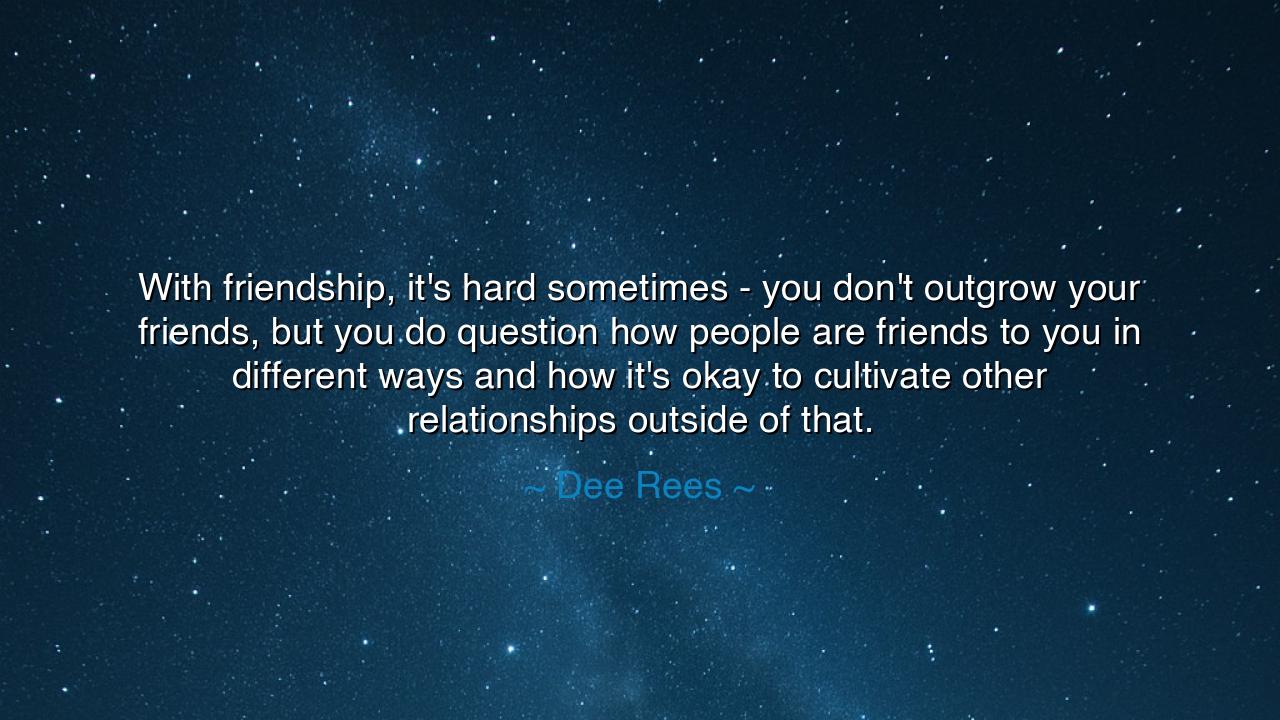
With friendship, it's hard sometimes - you don't outgrow your
With friendship, it's hard sometimes - you don't outgrow your friends, but you do question how people are friends to you in different ways and how it's okay to cultivate other relationships outside of that.






In the wise and tender words of Dee Rees, the soul finds a reflection of one of life’s most bittersweet truths: “With friendship, it's hard sometimes — you don't outgrow your friends, but you do question how people are friends to you in different ways and how it's okay to cultivate other relationships outside of that.” This saying is not merely about companionship—it is about growth, change, and the eternal rhythm of human connection. It speaks to the heart’s evolution across time, and how, though love for a friend may not die, the form it takes must often be reshaped by the tides of experience. In these few words, Rees captures the quiet ache of maturity—the realization that friendship, like the self, must transform to remain true.
In the ancient world, philosophers and poets alike pondered the nature of friendship. Aristotle, in his Nicomachean Ethics, spoke of three kinds of friendships: those of utility, of pleasure, and of virtue. The first two are fleeting, tied to circumstance or delight; but the third, he said, endures—rooted in goodness and mutual respect. Yet even such noble bonds, he warned, must bend with life’s changes, for no soul remains the same forever. This is the wisdom at the heart of Dee Rees’s words: that we do not outgrow our friends as if shedding them like old garments, but we outgrow the patterns by which we once knew them. We awaken to new needs, new rhythms, and we must let our friendships find their new shapes, or risk watching them fracture in silence.
To question how people are friends to you is an act of courage, not betrayal. It is to look into the mirror of time and ask: Do we still see each other clearly? Do we still walk the same road, or have our paths diverged beneath the stars? Such questioning is not a rejection of the past—it is a reverence for it. For only by reflection can we preserve what is real, and let go of what has turned hollow. Friendship, when true, can withstand such questioning; it adapts, it breathes, it learns to live anew in a different season. When false, it fades gently away, as leaves fall when winter arrives—not in bitterness, but in the quiet fulfillment of their purpose.
History itself bears witness to this truth. Think of Helen Keller and her beloved teacher Anne Sullivan. In their early years, they were bound by necessity—Anne the guiding light, Helen the eager soul emerging from darkness. Their bond was fierce, symbiotic, almost sacred. But as Helen grew into her own power, as she traveled, learned, and became a voice to the world, the friendship changed. Anne’s health declined, her role diminished, and tension arose. Yet even as their closeness shifted, their love did not die; it evolved. Helen once wrote, “True friends never part. Maybe in distance, but never in heart.” In this, she echoed precisely what Dee Rees reminds us—that we need not mourn when closeness gives way to distance, for each friendship has its season, and its memory becomes part of the soil that nourishes who we are.
To cultivate other relationships is not an act of disloyalty—it is the natural expansion of the spirit. The wise know that friendship, like a garden, thrives when new life is planted beside the old. The heart that fears new bonds becomes stagnant; the heart that welcomes them grows in strength and grace. Just as a river does not abandon the stones it once caressed when it flows onward to the sea, so too we do not forsake our old friends when we open our hearts to new ones. Life calls us toward connection in many forms—each friendship a different light upon the same horizon.
There is pain in this truth, yes—but there is beauty too. For love that adapts is love that endures. To hold too tightly to what once was is to strangle the possibility of what may yet be. When friendships grow distant, bless them; when new ones begin, welcome them. The ancient mystics would say: “The soul that clings cannot rise.” Let your friendships breathe, let them shift, let them find their rightful places in the ever-turning circle of your life.
And so, dear one, take heed of Dee Rees’s wisdom. Cherish your friends, but do not fear change. Ask yourself often: Who stands with me now, not out of habit, but out of heart? If some fall away, thank them for the time they walked beside you. If new souls appear, open your heart to the lessons they bring. In this way, your life becomes a tapestry of love unbroken—woven from threads of past and present, held together by gratitude, understanding, and the quiet grace of letting go.
For in the end, the art of friendship is not in keeping all close, but in loving all well—and in knowing that every bond, however brief or lasting, has its sacred purpose in the unfolding of your soul. Friendship, in its truest form, is not about possession, but about presence—the gentle echo of connection that lives forever within us, even as we continue to grow beyond it.






AAdministratorAdministrator
Welcome, honored guests. Please leave a comment, we will respond soon